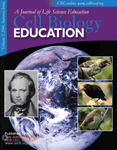Teaching Cell Biology to Nonscience Majors Through Forensics, or How to Design a Killer Course
Abstract
Nonscience majors often do not respond to traditional lecture-only biology courses. However, these students still need exposure to basic biological concepts. To accomplish this goal, forensic science was paired with compatible cell biology subjects. Several topics such as human development and molecular biology were found to fulfill this purpose. Another goal was to maximize the hands-on experience of the nonscience major students. This objective was fulfilled by specific activities such as fingerprinting and DNA typing. One particularly effective teaching tool was a mock murder mystery complete with a Grand Jury trial. Another objective was to improve students' attitudes toward science. This was successful in that students felt more confident in their own scientific abilities after taking the course. In pre/post tests, students answered four questions about their ability to conduct science. All four statements showed a positive shift after the course (p values ranging from .001 to .036, df = 23; n = 24). The emphasis on experiential pedagogy was also shown to increase critical thinking skills. In pre / post testing, students in this course significantly their performance on critical thinking assessment tests from 33.3% correct to 45.3% (p = .008, df = 4; n = 24).



